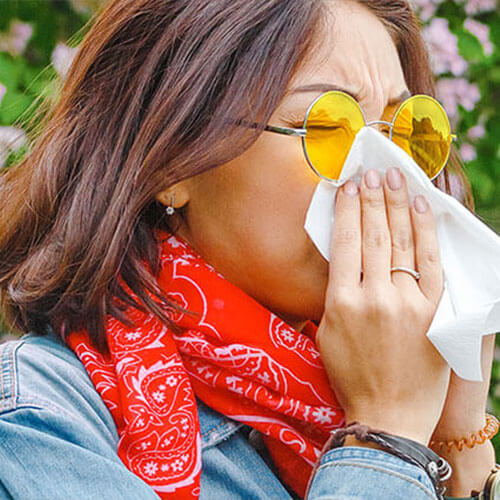Ever find yourself sneezing or sniffling after you eat, pat a cute dog, or enter somewhere dusty or moldy? If you answered yes, it’s a sign that your body is reacting to allergens in your surroundings.
While allergies are common, these reactions can be annoying in some instances. You wouldn’t want to deal with an allergic reaction during an important event, right?
If you’re struggling with allergies, keep reading! Here’s a crash course on why your body reacts negatively to allergens, along with good practices to keep in mind the next time you deal with allergies.
What Happens if You Have an Allergic Reaction?
When an allergen, or the substance responsible for allergies enters your body, your body can perceive it as an “invader.” As such, the immune system reacts to them and produces a chemical called histamine. Because of increased histamine production, you’ll experience allergy symptoms like coughing, sneezing, rashes, or itching, to name a few.
Your body also reacts to allergens by producing antibodies called Immunoglobulin E (IgE). This usually occurs during your first exposure to an allergen. IgE antibodies’ main purpose is to find the allergens responsible for the reaction and eliminate them from your body.
What Causes Allergies?
There are many reasons allergies happen. Some of the most common allergens include
- Drugs or medicines like penicillin or aspirin
- Pollen
- Dust mites found in pillows, mattresses, carpets, and upholstery
- Latex products like rubber gloves
- Food products like milk, egg, soy, wheat, shellfish, peanuts, and tree nuts
- Insect bites, particularly of bees
- Pets like cats and dogs (mainly due to exposure of dead skin or dander shed by these animals)
- Mold found in damp areas inside your home (in the basement, kitchen, or bathroom) or outdoors
If you’re unsure about the cause of your allergies, you can undergo either a skin test or blood test to determine it.
How Do You Resolve Allergies?
If you get an allergic reaction, try to stay calm. Make a quick mental note of the symptoms you’re experiencing and the potential cause of the reaction.
Moreover, if you notice that you quickly react to allergens and/or experienced previous reactions, ask your doctor about medications you can take that may help provide immediate relief.
There are OTC antihistamines and decongestants available. The former refers to a class of medicines that help block or reduce allergy-causing histamines. On the other hand, decongestants help address nasal passages that have been swollen or congested because of an allergic reaction.
However, if there are severe symptoms (whether you or someone you know is exhibiting them) like breathing difficulties, loss of circulation, low blood pressure, or fainting, seek medical attention immediately. These can already be signs of anaphylaxis or anaphylactic shock, wherein your body’s immune system tends to overreact to a particular allergen.
Apart from the symptoms it triggers, anaphylaxis may also cause the narrowing of your airways (leading to breathing difficulties). It’s also possible that blood vessels may leak, causing fluid build-up, and potentially a type of swelling called an edema.
If your allergies persist for a longer time, consult your doctor right away. They may be able to discover why your reactions are different compared to others and/or recommend more potent treatments that may help prevent the devastating effects of allergies.
References:
https://www.aafa.org/types-of-allergies/
https://my.clevelandclinic.org/health/diseases/8610-allergy-overview
https://www.webmd.com/allergies/know-your-allergy-triggers
https://www.webmd.com/allergies/antihistamines-for-allergies
https://www.webmd.com/allergies/antihistamines-1
https://www.mayoclinic.org/diseases-conditions/pet-allergy/symptoms-causes/syc-20352192
https://www.mayoclinic.org/tests-procedures/allergy-shots/about/pac-20392876
https://www.mayoclinic.org/diseases-conditions/anaphylaxis/symptoms-causes/syc-20351468
https://www.health.harvard.edu/staying-healthy/3-ways-to-manage-allergies
https://www.medicalnewstoday.com/articles/321500#-what-is-an-allergic-reaction
https://www.healthline.com/health/allergies/timeline-anaphylactic-reaction#stay-calm
https://www.healthline.com/health/allergies/allergic-reaction#symptoms
https://www.nhs.uk/conditions/anaphylaxis/
https://www.medicalnewstoday.com/articles/216062#what-happens
https://www.medicalnewstoday.com/articles/159111#_noHeaderPrefixedContent








